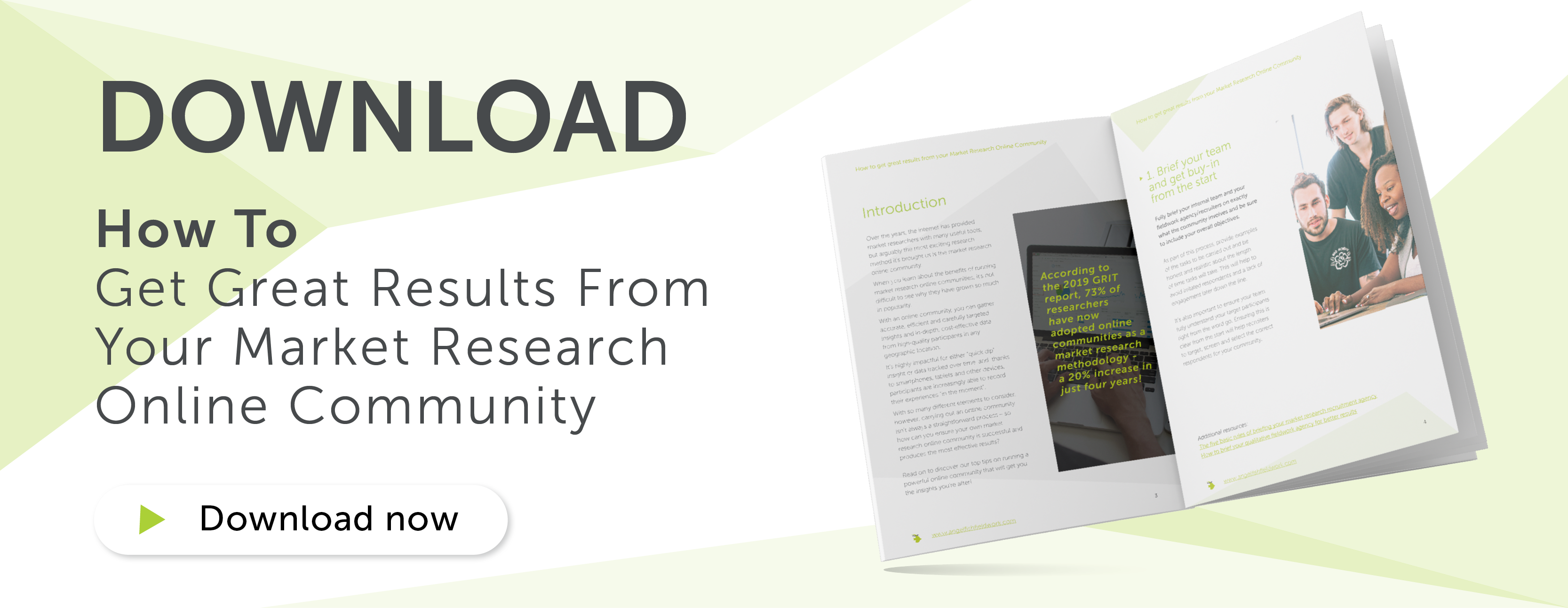
Good, bad and the ugly of market research online communities
Market research online communities are a popular methodology in any market researcher’s toolkit. They consist of a group of respondents taking part in research by completing various tasks and activities via an online platform, and it’s easy to see why they are so popular: they offer a simple, cost-effective way of communicating with respondents to deliver deep insights in a safe and secure setting. From the benefits of MROCs and key considerations to the times when online communities might not be the best option, read on to discover the good, the bad, and the ugly of market research online communities and all they have to offer.
The good: the appeal of MROCs
A group of verified respondents building relationships with you and their peers and readily sharing their views and opinions without the logistical nightmare that comes with organising a face-to-face research session? Sounds like a dream come true, right? Wrong! In fact, it’s this exact ability to capture the thoughts and habits of a group of participants that has allowed market research online communities to thrive.
Market research online communities operate via a completely secure platform that, for all intents and purposes, emulates the look and feel of traditional social media sites such as Facebook. The difference with an online community is that the platform has been specifically designed for researchers and market research participants. As a result, it’s a completely private environment that allows respondents to share their thoughts, opinions and feelings.
There are a number of benefits to conducting market research in such a way. For starters, participants tend to feel more relaxed as they don’t have to worry about face-to-face contact with either their peers or a moderator. In addition, because of the community aspect, respondents are encouraged to speak amongst themselves rather than just to the group moderator. This means the answers will be more honest and that you can access really in-depth insights - especially from participants who might be shyer in person.
Another positive of online communities is the variety of different tasks you can set. Not only does this mean that data can be collated in a number of different formats, adding an additional level of insight to the research beyond a standard group discussion, but it also helps to keep your respondents motivated. From mini-surveys to blogging and video diaries to photo collages, offering a range of different tasks makes sure your respondents remain excited and engaged throughout the duration of the community.
Finally, there’s the fact that it all takes place online. This digital aspect of market research online communities makes it easier for researchers to collate information, but it also allows respondents to participate in research in an environment that they feel comfortable in – especially the millennial generation and beyond for whom social sharing is the norm. The online nature of MROCs also makes it easy for moderators to manage the community. From monitoring responses and responding to live feedback in real time, the flexibility allows researchers to get the most out of the research. It’s also a great way for clients to listen in and observe how consumers are honestly reacting to their product or service, too!

The bad: important things to consider
As with everything in life, however, market research online communities aren’t perfect - and it’s important to be aware of all considerations when deciding whether or not MROCs are the right methodology for your project.
Firstly, it’s important to understand the type of community you need - which means that setting clear objectives from the start is essential. This will allow you to find the right people and manage your community effectively in order to drive the results you need. At this point, you’ll also need to think about how long you want to run your online community for. Generally speaking, MROCs can range from short term projects of a week to more long-term commitments lasting 12 months or more.
Short-term communities will be more appropriate if you have one main objective from your research, whilst a long-term community will allow you to explore a wider range of topics in more detail with the same community members. Inevitably, with longer lead times comes the requirement for greater effort and commitment in order to keep your participants motivated and engaged to actively participate in the discussions. This means that management time can be pretty intensive.
Incentivisation can be a useful tool to maintain engagement, and spot prizes or competitions are great ways to keep the momentum going throughout the duration of your community - however, you will need to keep your budget in mind. Alternatively, simply ensuring the activities required are fun and interesting enough to appeal to the demographic you are targeting can also be a good way to boost engagement, too.
If you are running a more long-term community, you’ll also need to think about dropouts. Generally speaking, the longer your project runs, the higher the chance of dropouts - so it’s important to over-recruit where possible, too. Good practice suggests over recruiting by around 30% - so if your incidence rate is less than 20%, an online community might not be your best bet.
The ugly: when MROCs just won’t work
We’ve heard about the good and the bad - and now comes the ugly. Naturally, for some, the concept of an MROC won’t ever be suitable. For some clients, nothing can replace the role of face-to-face interaction and actually seeing the respondents in-person, whilst another common complexity with online communities is the time and commitment they require. Additionally, online methods might not be the best bet for your target audience either - it all depends on the individual project.
Weighing it all up
In conclusion, when you look at the positives and negatives of online communities, in most cases, market research online communities are a fantastic way to access in-depth insights at speed. It’s no wonder they’re continuing to grow in popularity across the world of research! Whether you are well versed in the area or if MROCs are a new technique to add to your toolkit, download our handy guide to ensure your next community is a successful one:



-Feb-19-2026-09-59-49-0345-AM.png)










